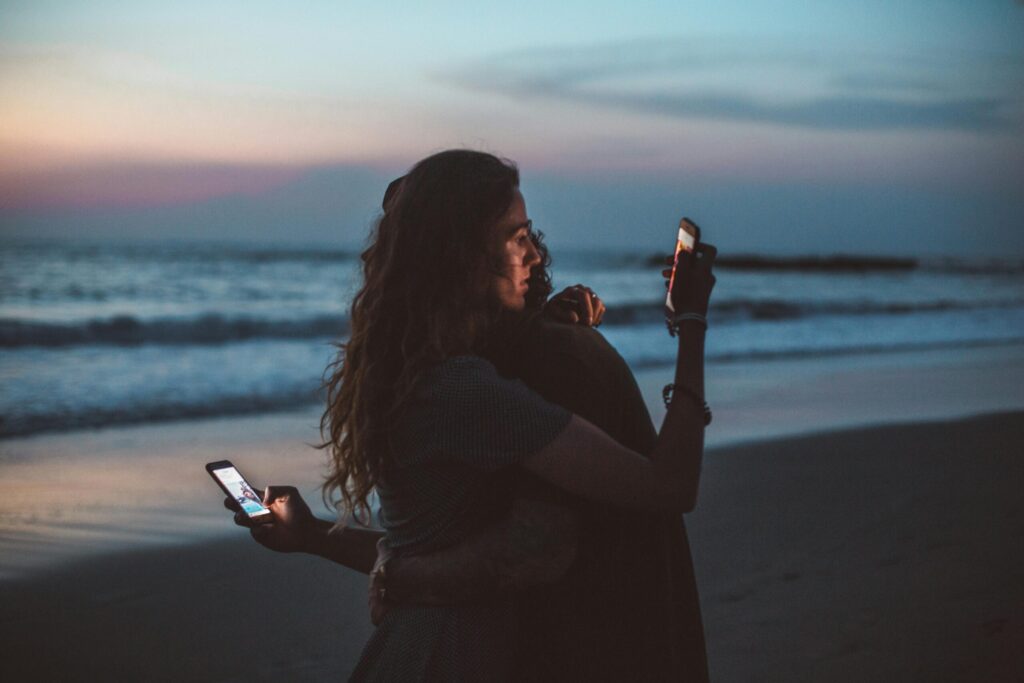Tonight, screens are likely to be the last thing we look at before we sleep. It may be scrolling through social media endlessly, streaming a TV show, or checking emails, but our pre-bedtime rituals revolve around screens – and that’s catching up with us.
Not all screen time is equal, though, when it comes to how it interferes with sleep. So, which of these late-night habits interferes the most with sleep: scrolling, streaming, or working?
Let’s break it down.
Why Screens Interfere With Sleep
The biggest issue with screens is blue light. Emitted by phones, computers, and TVs, blue light suppresses melatonin – the hormone that helps us fall asleep.
But it’s not just the light itself; it’s also what we’re doing on these screens. Emotional stimulation, mental engagement, and stress from digital content can all delay your mental ability to wind down.
Scrolling Social Media: A Huge Sleep Thief
Scrolling endlessly on Instagram, TikTok, or X is many people’s norm as a bedtime routine. It may look harmless – a quick glance – but before you notice it, an hour (or more) has gone by.
Apps, especially TikTok, are designed to make you stay. Customized feed, endless content, and constant push notifications keep your mind active. These short hits of dopamine are stimulating and make it difficult to relax and fall asleep.
Furthermore, the phone being right next to your face results in greater exposure to blue light than from TVs or laptops. Plus, the brain stimulation and fear of missing out (FOMO), making scrolling one of the worst sleep habits.
Verdict: Very stimulating and likely the most addictive – social media scrolling is a significant sleep disrupter. Its endless content and constant notifications can keep your brain alert long after you’ve put the phone down, making it one of the most damaging screen habits for restful sleep.
Streaming on Smart TVs: Better, But Not Perfect Yet
Streaming is less social than social media and requires less intense blue light due to the distance from your eyes with Smart TVs. This makes it look like it’s better for sleep – yet it’s still not perfect.
Autoplay features, over-the-top dramas, and cliffhangers during binge-watching can lead to “just one more episode” routines, which are hours of screen time. Bed viewing also trains your brain to associate your bed with stimulation, not sleep.
Besides the programming, Smart TVs also collect information about what you watch – and when. This is usually employed for targeted ads and recommendations, keeping you hooked for even longer.
To avoid it, tons of users opt to use privacy tools, like Smart TV VPNs, to encrypt their TV’s internet surfing and limit information gathering – though their effectiveness can vary with device and apps in use.
Verdict: While the distance from the screen may reduce blue light exposure, the stimulating content and extended viewing can still delay sleep and disrupt your bedtime routine.
You could say it’s less risky than scrolling, but nonetheless unsafe if binge-watching a new show each evening is the habit.
Working Late: A Sneaky Productivity Trap
For many, working late feels like it’s a must – but it’s a stealthy sleep robber. Reading emails, completing tasks, or setting up tomorrow keeps your mind in “work mode”.
This type of screen use is more cognitively demanding than scrolling or streaming. It often involves decision-making, problem-solving, and stress – all of which delay the mental relaxation needed for sleep.
What’s worse, working from bed, especially since the rise of remote work, blurs the line between your rest space and your workspace. That confusion can make it harder to fall asleep even after shutting the laptop.
Verdict: Intellectually challenging and stress-inducing – working late is probably the most harmful screen time during the night. It keeps the brain in high gear, making it difficult to unwind, and can significantly delay both sleep onset and quality.
How to Sleep Smarter (Even with Screens)
Whatever screen you’re glued to in the night, there’s a method to reduce the damage:
-
Set a “tech curfew” and turn off screens 30-60 minutes before bedtime.
-
Use blue light filters or glasses during the night.
-
Avoid emotionally engaging content close to bedtime.
-
Set a wind-down routine like reading, listening to music, or practicing mindfulness.
-
Keep devices out of the bedroom if possible.
Final Thoughts
Not all screen time is created equal when it comes to sleep. Swiping social media is stimulating and addictive, streaming is uncomfortably passive but binge-susceptible, and working late keeps your brain too alert to sleep.
If you’re serious about sleeping better, one of the greatest things you can do is place some boundaries around screen use. Having a good night’s sleep might be as easy as turning off the screen – regardless of how large it is.



 David Benefiel is a seasoned fitness professional and passionate writer for My Healthy Living and Strategies, where he focuses on delivering practical advice for maintaining a balanced and healthy lifestyle. With years of experience in strength training, nutrition, and holistic wellness, David offers in-depth guidance to help readers achieve their personal health goals, whether through tailored fitness plans, dietary changes, or mental wellness practices.
David Benefiel is a seasoned fitness professional and passionate writer for My Healthy Living and Strategies, where he focuses on delivering practical advice for maintaining a balanced and healthy lifestyle. With years of experience in strength training, nutrition, and holistic wellness, David offers in-depth guidance to help readers achieve their personal health goals, whether through tailored fitness plans, dietary changes, or mental wellness practices.